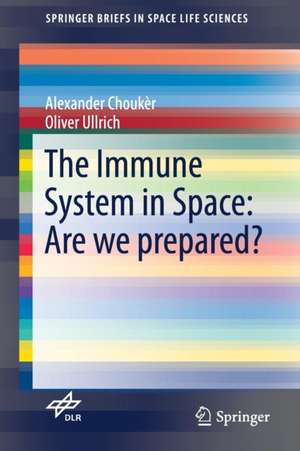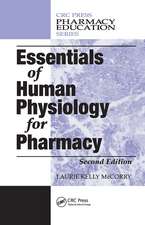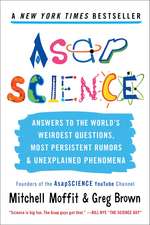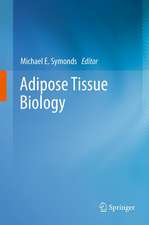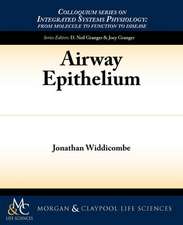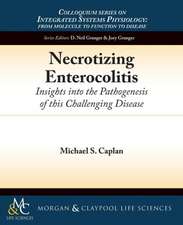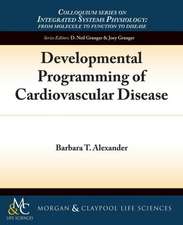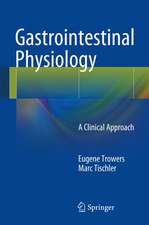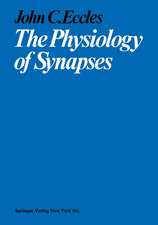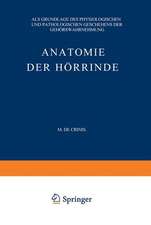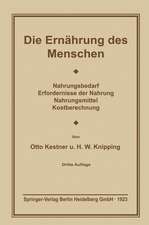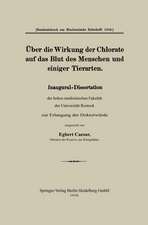The Immune System in Space: Are we prepared?: SpringerBriefs in Space Life Sciences
Autor Alexander Choukèr, Oliver Ullrichen Limba Engleză Paperback – 2 noi 2016
This book gives insight into the mechanism of the immune system and the influence of the environment on earth. Further, the book explains the changes that occur in our immune system in the absence of gravity and their fundamental consequences.
The book is written for immunologists and researchers in human physiology under normal and stressfull conditions.
Preț: 360.70 lei
Preț vechi: 379.68 lei
-5% Nou
Puncte Express: 541
Preț estimativ în valută:
69.03€ • 71.80$ • 56.99£
69.03€ • 71.80$ • 56.99£
Carte tipărită la comandă
Livrare economică 14-28 aprilie
Preluare comenzi: 021 569.72.76
Specificații
ISBN-13: 9783319414645
ISBN-10: 331941464X
Pagini: 132
Ilustrații: XVII, 127 p. 15 illus., 13 illus. in color.
Dimensiuni: 155 x 235 x 8 mm
Greutate: 0.22 kg
Ediția:1st ed. 2016
Editura: Springer International Publishing
Colecția Springer
Seria SpringerBriefs in Space Life Sciences
Locul publicării:Cham, Switzerland
ISBN-10: 331941464X
Pagini: 132
Ilustrații: XVII, 127 p. 15 illus., 13 illus. in color.
Dimensiuni: 155 x 235 x 8 mm
Greutate: 0.22 kg
Ediția:1st ed. 2016
Editura: Springer International Publishing
Colecția Springer
Seria SpringerBriefs in Space Life Sciences
Locul publicării:Cham, Switzerland
Cuprins
Immune system in evolution.- The immune system and man – environment interaction from the clinical and from fundamental research perspectives.- The effects of Space and Space like conditions on Immune functions from the clinical and from fundamental perspective.- The upcoming venues: Individualized preventive or therapeutic measure, - In vitro and in vivo tools to measure the efficacy of such measures.- Summary.
Recenzii
This book was awarded by The International Academy of Astronautics (IAA) in 2018 with the Life Science Book Award.
Notă biografică
Alexander Choukèr is Professor of Medicine at the Ludwig-Maximilians-University (LMU) in Munich, Germany and guest lecturer at King´s College, London, UK. He is clinical specialist in Anesthesiology at the University Hospital where heads the “Stress and Immunity” research. His medical and immunological training was received at the LMU and at the National Institutes of Allergy and Infectious Diseases (NIAID), Bethesda/USA, respectively. For almost about two decades he has been actively involved in research on the International Space Station, in space analogue environments and been leading inter-disciplinary teams for translational and experimental research. He is member of the European Space Sciences Committee (ESSC) and has been advisor and chairman of the European Space Agency´s (ESA) Life Sciences Working Group and the ESA Topical Team on Immunology.
Oliver Ullrich is Full Professor (Ordinarius), Chair of Anatomy, at the University of Zurich and Professor (Hon.-Prof.) ofSpace Biotechnology in the Department of Machine Design (IMK), Engineering Design and Product Development, Otto-von-Guericke-University Magdeburg, Germany. He is leading key research projects in the life sciences research program of the European Space Agency (ESA) and the German Aerospace Center (DLR), conducted so far during 17 parabolic flight campaigns, 4 sounding rocket missions and 3 orbital missions, including the International Space Station (ISS). He is elected Academician of the International Academy of Astronautics (IAA) for lifetime, Head of Space Medicine / Life Sciences and Member of the Council, German Society for Aerospace Medicine and Project Director and Chairman of the Swiss Parabolic Flight Platform.
Oliver Ullrich is Full Professor (Ordinarius), Chair of Anatomy, at the University of Zurich and Professor (Hon.-Prof.) ofSpace Biotechnology in the Department of Machine Design (IMK), Engineering Design and Product Development, Otto-von-Guericke-University Magdeburg, Germany. He is leading key research projects in the life sciences research program of the European Space Agency (ESA) and the German Aerospace Center (DLR), conducted so far during 17 parabolic flight campaigns, 4 sounding rocket missions and 3 orbital missions, including the International Space Station (ISS). He is elected Academician of the International Academy of Astronautics (IAA) for lifetime, Head of Space Medicine / Life Sciences and Member of the Council, German Society for Aerospace Medicine and Project Director and Chairman of the Swiss Parabolic Flight Platform.
Textul de pe ultima copertă
This book gives insight into the mechanism of the immune system and the influence of the environment on earth. Further, the book explains the changes that occur in our immune system in the absence of gravity and their fundamental consequences.
The book is written for immunologists and researchers in human physiology under normal and stressfull conditions.
Caracteristici
Provides insight into the interaction of the immune system and the environment under normal and extreme conditions The reader will learn about immunological side-effects during long-duration missions in space Preventive measures and therapies are depicted
